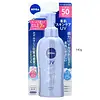What's inside
What's inside
 Key Ingredients
Key Ingredients

 Benefits
Benefits

 Concerns
Concerns

 Ingredients Side-by-side
Ingredients Side-by-side

Water
Skin ConditioningButylene Glycol
HumectantEthylhexyl Methoxycinnamate
UV AbsorberHydrogenated Polyisobutene
EmollientCetyl Ethylhexanoate
EmollientDiethylamino Hydroxybenzoyl Hexyl Benzoate
UV FilterTitanium Dioxide
Cosmetic ColorantSilica
AbrasiveCannabis Sativa Seed Extract
EmollientOcimum Basilicum Flower/Leaf Extract
TonicRosa Alba Leaf/Stem Extract
HumectantZingiber Officinale Root Extract
MaskingAbies Alba Seed Extract
AntimicrobialPEG-12 Dimethicone
Skin ConditioningEthylhexyl Triazone
UV AbsorberBis-Ethylhexyloxyphenol Methoxyphenyl Triazine
Skin ConditioningStearyl Dimethicone
EmollientTriethoxycaprylylsilane
Sodium Acrylate/Sodium Acryloyldimethyl Taurate Copolymer
Emulsion StabilisingPotassium Hydroxide
BufferingPolyglyceryl-3 Methylglucose Distearate
EmulsifyingTocopheryl Acetate
AntioxidantXanthan Gum
EmulsifyingIsohexadecane
EmollientPolysorbate 80
EmulsifyingSorbitan Oleate
EmulsifyingGlycerin
HumectantTocopherol
AntioxidantCitric Acid
BufferingZinc Phosphate
Phenoxyethanol
PreservativeBHT
AntioxidantWater, Butylene Glycol, Ethylhexyl Methoxycinnamate, Hydrogenated Polyisobutene, Cetyl Ethylhexanoate, Diethylamino Hydroxybenzoyl Hexyl Benzoate, Titanium Dioxide, Silica, Cannabis Sativa Seed Extract, Ocimum Basilicum Flower/Leaf Extract, Rosa Alba Leaf/Stem Extract, Zingiber Officinale Root Extract, Abies Alba Seed Extract, PEG-12 Dimethicone, Ethylhexyl Triazone, Bis-Ethylhexyloxyphenol Methoxyphenyl Triazine, Stearyl Dimethicone, Triethoxycaprylylsilane, Sodium Acrylate/Sodium Acryloyldimethyl Taurate Copolymer, Potassium Hydroxide, Polyglyceryl-3 Methylglucose Distearate, Tocopheryl Acetate, Xanthan Gum, Isohexadecane, Polysorbate 80, Sorbitan Oleate, Glycerin, Tocopherol, Citric Acid, Zinc Phosphate, Phenoxyethanol, BHT
Water
Skin ConditioningEthylhexyl Methoxycinnamate
UV AbsorberAlcohol Denat.
AntimicrobialPropylene Glycol
HumectantDimethicone
EmollientEthylhexyl Triazone
UV AbsorberDiethylamino Hydroxybenzoyl Hexyl Benzoate
UV FilterButylene Glycol
HumectantLysine Lauroyl Glutamate
CleansingPyrus Cydonia Seed Extract
MaskingGeranium Robertianum Extract
AstringentPhellodendron Amurense Bark Extract
Skin ConditioningSodium Hyaluronate
HumectantAcrylates/C10-30 Alkyl Acrylate Crosspolymer
Emulsion StabilisingCarbomer
Emulsion StabilisingTocopheryl Acetate
AntioxidantSodium Hydroxide
BufferingBHT
AntioxidantMethylparaben
PreservativeWater, Ethylhexyl Methoxycinnamate, Alcohol Denat., Propylene Glycol, Dimethicone, Ethylhexyl Triazone, Diethylamino Hydroxybenzoyl Hexyl Benzoate, Butylene Glycol, Lysine Lauroyl Glutamate, Pyrus Cydonia Seed Extract, Geranium Robertianum Extract, Phellodendron Amurense Bark Extract, Sodium Hyaluronate, Acrylates/C10-30 Alkyl Acrylate Crosspolymer, Carbomer, Tocopheryl Acetate, Sodium Hydroxide, BHT, Methylparaben
 Reviews
Reviews

Ingredients Explained
These ingredients are found in both products.
Ingredients higher up in an ingredient list are typically present in a larger amount.
BHT is a synthetic antioxidant and preservative.
As an antioxidant, it helps your body fight off free-radicals. Free-radicals are molecules that may damage your skin cells.
As a preservative, it is used to stabilize products and prevent them from degrading. Specifically, BHT prevents degradation from oxidation.
The concerns related to BHT come from oral studies; this ingredient is currently allowed for use by both the FDA and EU.
However, it was recently restricted for use in the UK as of April 2024.
Learn more about BHTButylene Glycol (or BG) is used within cosmetic products for a few different reasons:
Overall, Butylene Glycol is a safe and well-rounded ingredient that works well with other ingredients.
Though this ingredient works well with most skin types, some people with sensitive skin may experience a reaction such as allergic rashes, closed comedones, or itchiness.
Learn more about Butylene GlycolDiethylamino Hydroxybenzoyl Hexyl Benzoate (DHHB) is a chemical UV-A absorber. It is formulated for high UVA protection (320-400 nm).
DHHB is well-liked for:
DHHB has been approved by the EU, Japan, Taiwan, and South America for use up to 10%. Unfortunately, it has not been approved for use in the US or Canada due to slow regulatory processes.
This ingredient is soluble in oils, fats, and lipids.
Learn more about Diethylamino Hydroxybenzoyl Hexyl BenzoateEthylhexyl Methoxycinnamate is an organic compound that provides UVB protection. It often goes by the more common name of octinoxate. It is created from methoxycinnamic acid and 2-ethylhexanol.
Ethylhexyl Methoxycinnamate absorbs UVB rays with wavelengths between 280-320 nm. UV absorbers protect your skin by using chemical reactions to convert UV rays into heat and energy.
UVB (290-320 nm) rays emit more energy than UVA rays. They are capable of damaging DNA, causing sunburns and are thought to be linked to skin cancer.
The state of Hawaii has banned sunscreens containing octinoxate due to its potential impact on coral reefs. More research is needed to bridge gaps in this research. The European Union allows higher levels of octinoxate in sunscreens than the US and Australia.
Ethylhexyl Methoxycinnamate is oil soluble. It is not stable and may lose efficacy when exposed to sunlight.
Learn more about Ethylhexyl MethoxycinnamateEthylhexyl Triazone is a modern chemical sunscreen that protects from UV-B radiation.
It is the most effective of existing UV-B filters, as it provides the highest level of photo-stable absorption. It protects from the entire UV-B range (280 to 320nm), with it's highest level of protection at 314nm.
Ethylhexyl Triazone is oil soluble, oderless and colorless, which mean it is able to be incorporated into a variety of different formulations.
It is not currently available within the United States due to slow changing FDA regulations. Outside of the US, it is used in formulations at concentrations up to 5%.
Learn more about Ethylhexyl TriazoneTocopheryl Acetate is AKA Vitamin E. It is an antioxidant and protects your skin from free radicals. Free radicals damage the skin by breaking down collagen.
One study found using Tocopheryl Acetate with Vitamin C decreased the number of sunburned cells.
Tocopheryl Acetate is commonly found in both skincare and dietary supplements.
Learn more about Tocopheryl AcetateWater. It's the most common cosmetic ingredient of all. You'll usually see it at the top of ingredient lists, meaning that it makes up the largest part of the product.
So why is it so popular? Water most often acts as a solvent - this means that it helps dissolve other ingredients into the formulation.
You'll also recognize water as that liquid we all need to stay alive. If you see this, drink a glass of water. Stay hydrated!
Learn more about Water